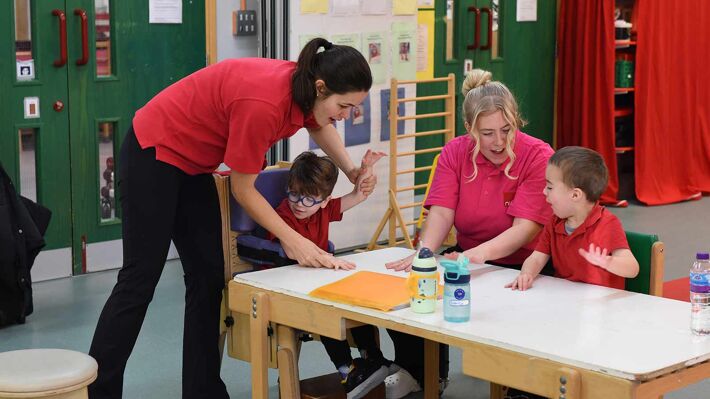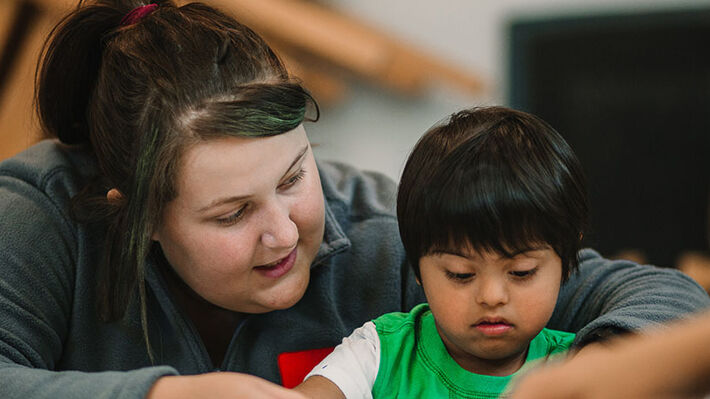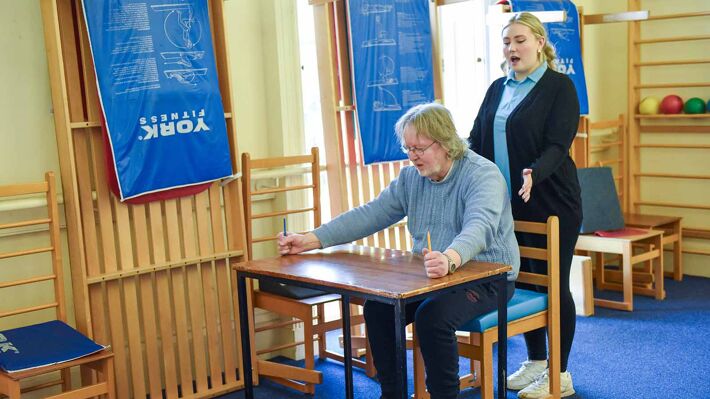Conductive Education - BA (Hons)
Currently viewing course to start in 2026/27 Entry.
Transform the lives of people with disabilities and neurological motor disorders to help them as independent as possible with our BA (Hons) in Conductive Education. Delivered by the National Institute of Conductive Education (NICE), this unique course is the only one in the UK to qualify you as a professional conductor to work with children and/or adults with physical disabilities.
- Level Undergraduate
- Study mode Full Time
- Award BA (Hons)
- Start date September 2026
- Fees View course fees
- Subject
- Location National Institute of Conductive Education
This course is:
Overview
0:00
NICE is a charity set up to help adults
0:02
and children with neurological
0:04
conditions. We have a preschool
0:06
intervention, so children starting
0:09
before school. We have an outstanding
0:11
offstead independent school as well. And
0:13
then we have our nice adults department,
0:15
which is where I work. So we work with
0:17
Parkinson's, stroke, MS, cereble pulsey.
0:20
The course I studied is the conductive
0:22
education course. It's a BA honors
0:24
course and with that you also get
0:26
qualified conductor status. So when you
0:28
finish your degree, you also get um the
0:31
status in on the side to enable you to
0:34
practice as a qualified conductor. The
0:36
course 100% prepared me and that's one
0:39
of the things that stood out is that
0:40
you're in practice the whole time that
0:42
you're studying. I've been really lucky
0:45
enough as a student to be part of um the
0:47
conductor's world. So I've been able to
0:49
present at conferences um as a student
0:52
and as a professional. The most
0:54
rewarding part of my job is being able
0:56
to be a part of creating independence
0:58
for people and having the role and
1:01
responsibility to create opportunities
1:03
for people to do that. There's so many
1:05
examples I could use, but we've had an
1:07
individual in a stroke group who I
1:09
remember working with right at the start
1:10
when she came and she was so fearful of
1:14
standing up by herself and just even
1:16
being left alone. And fast forward to a
1:18
year on, we've been able to help her be
1:21
able to do these things independently.
1:23
And the smile that's given her and the
1:26
confident that it's given her is
1:28
completely indescribable. And it's the
1:29
reason I come to work every day is for
1:32
those moments. And that's why I love it
1:34
so much. First of all, you you know she
1:36
cares and she always
1:39
looks out for him and she looks out for
1:43
anything you might be struggling with.
1:44
So she'll step in at the right time to
1:47
prompt him. So she's she's really caring
1:49
and she she doesn't get phased. I I
1:52
think she's brilliant.
1:56
I completed my three-year degree at
1:57
Birmingham City University and I
1:59
graduated in 2020 and then two weeks
2:02
later I had my interview for a slot at
2:04
Nice and I'd already had my work
2:06
experience here. So I knew that it would
2:08
be an ideal place to work. Conductive
2:10
education is a holistic therapy for
2:12
individuals with neurological movement
2:14
disorders. So anybody with sort of like
2:16
any sort of movement delay, physical
2:18
delay. I would say that no two days are
2:19
the same, which is what I absolutely
2:21
love. So I love getting to work with the
2:23
families and seeing the children.
2:25
Everybody's journey is different. So you
2:27
really feel like you become part of the
2:30
family unit, part of their journey.
2:31
Megan's been amazing. like even just now
2:34
um she's helped she's got like magic
2:36
hands putting on the air for for Francis
2:39
with the the way she sort of interacts
2:42
with them and gets them to do the
2:43
exercises that we as parents sort of
2:45
become the bad guys at home I guess and
2:47
coming is just yeah she's got the the
2:50
golden touch to get get them to do what
2:52
what needs to be done.
2:53
It's really tricky to say what's
2:54
rewarding about this job because
2:56
everything is so rewarding about it
2:58
which is what I I love. It's very an
3:01
emotional time for families. So then
3:03
them them trusting you and gaining their
3:04
trust. And when you finally get that
3:06
trust, it's really really good. It's
3:08
really nice, you know, you build the
3:09
trust of the children. So like some
3:10
children like um you know, when they
3:12
come into their session, it's like, "Oh
3:13
no, I want Megan to put on my special
3:15
body because you know, she does it
3:17
differently to you." It's nice that you
3:18
know, they come to their sessions and
3:20
they don't see it as coming to do um
3:22
therapy or intense work. I would say
3:24
just contact us at NICE, your local
3:26
center, arrange a visit, go and see and
3:28
experience what conductive education is.
Transform the lives of people with disabilities and neurological motor disorders to help them as independent as possible with our BA (Hons) in Conductive Education.
Delivered by the National Institute of Conductive Education (NICE), this unique course is the only one in the UK to qualify you as a professional conductor to work with children and/or adults with physical disabilities.
What's covered in this course?
The course is structured across six semesters. Each semester lasts 15 weeks, therefore you are expected to study for a minimum of 30 weeks per year.
Over the three years you will learn about topics such as neurological motor disorders, the professional skills needed to teach and develop skills including movement, confidence, understanding and communication, conductive practice and the work of professionals in the field.
You will be taught at the Conductive College, located in Moseley, which is a dedicated training space specifically for professionals, families and carers in the field of Conductive Education. Courses, leading to a qualification, will be accredited by Birmingham City University.
The conductive college is a key tool for the development of Conductive Education in the future and an essential part of the work of the NICE - the unique charity that believes every person with a movement disorder has the right to specialised services which meet their needs.
You will also start to learn about carrying out research and begin to investigate theoretical concepts in the light of practical experience and knowledge.
By the end of the course, you will have covered a range of academic subjects, all of which will enhance your ability to work as a professional conductor in a range of different countries or cultures.
This course develops you as a person and enables you to help children and adults with complex needs and enhance their life too! There is constant practical and academic tuition, support and feedback throughout. A truly fantastic degree that makes a difference!
Susan Mechan 3rd year BA (Hons) Conductive Education student
Why Choose Us?
- This is the only course in the UK to offer these life changing skills for people who wish to work in conductive education (CE) and transform lives for those with disabilities and neurological motor disorders
- You will learn at the National Institute of Conductive Education (NICE), which is a small organisation with a community atmosphere, offering excellent support to its students
- Invaluable learning opportunities - there will be lots of opportunities for you to develop practical hands-on skills alongside qualified, experienced conductors so that you graduate ready for employment
- Benefit from our partnerships with industry - gain practical experiences both at NICE in Birmingham, as well as a range of schools and CE centres across the UK
- Gain valuable employability skills - you will graduate from this course able to work in centres, schools and units all over the world, enabling you to seek employment in a range of different countries or cultures
- Continue on to further education - you will develop your knowledge, understanding and adaptability, providing you with a solid basis from which you can achieve further qualifications e.g. PGCE
Similar Courses
Entry Requirements
Essential requirements
96 UCAS Tariff points. Learn more about UCAS Tariff points.
*Please note that whilst not an entry requirement for this course, you will be required to complete an Enhanced Disclosure and Barring Service (DBS) clearance to commence placement. You will be guided through the process during induction week.
If you have a qualification that is not listed, please contact us.
Fees & How to Apply
UK students
Annual and modular tuition fees shown are applicable to the first year of study. The University reserves the right to increase fees for subsequent years of study in line with increases in inflation (capped at 5%) or to reflect changes in Government funding policies or changes agreed by Parliament. View fees for continuing students.
Award: BA (Hons)
Starting: Sep 2026
- Mode
- Duration
- Fees
- Full Time
- 3 years
- £9,535 in 2026/27 ✱ Important note for this price
- Apply via UCAS
(↩Back to price) * The Government is proposing to apply an inflationary increase to regulated tuition fees for 2026/27 and the University is planning on increasing fees to that maximum level once confirmed.
International students
Sorry, this course is not available to International students.
Guidance for UK/EU students
UK and EU students applying for most undergraduate degree courses in the UK will need to apply through UCAS.
The Universities and Colleges Admissions Service (UCAS) is a UK organisation responsible for managing applications to university and college.
Applying through UCAS
Register with UCAS
Login to UCAS
Complete your details
Select your course
Write a personal statement
Get a reference
Pay your application fee
Send UCAS your application
Personal statement
The personal statement gives you a crucial opportunity to say why you’re applying and why the institution should accept you.
Here are the three areas you’ll need to address:
- Why do you want to study this course or subject?
Here’s where you explain what makes this course exciting to you. Think about your motivations for studying the course and your future plans. If you’re planning to take a year out, don't forget to give your reasons.
- How have your qualifications and studies helped you to prepare for this course or subject?
This is your chance to show what you’ve learned at school or college. You should include the skills and knowledge you’ve gained from education or training and how this will help you succeed in your chosen course.
- What else have you done to prepare outside of education, and why are these experiences useful?
Not everything you’ve learned comes from the classroom. Life experience counts too! You might want to talk about work experience, employment, or volunteering and how they’ve helped you develop the skills needed for your chosen course or future career.
Worried about Personal Statements?
If you've got no idea where to start or just want to check you're on the right track, we’ve got expert advice and real examples from our students to help you nail your personal statement. You can even download our ultimate personal statement guide for free.
Course in Depth
Year One
In your first year you'll gain the basic background understanding of the philosophy and methodology of Conductive Education, and start to learn about neurological movement disorders and begin to understand how these impact on the lives of children and adults.
Alongside this theoretical knowledge, you'll begin the process of developing a range of professional skills all leading to teaching children/adults how to develop skills including movement, confidence, understanding and communication.
Modules
Year Two
In Year two, theory and practical skills will start to merge – and we’ll expect you to plan and lead programmes and sessions for either children or adults, under the supervision of a qualified conductor.
You will also start to learn about carrying out research and begin to investigate theoretical concepts in the light of practical experience and knowledge.
Modules
Year Three
In Year three, it's all about having increased responsibility in conductive groups under distant supervision from a conductor.
You'll extend your knowledge and understanding of motor disorders, conductive practice and the work of the professionals in the field. These theoretical concepts will be fused into practical application and you will undertake an independent piece of research.
Modules
Download course specification
Download nowCourse Structure
- Practice: NICE (Birmingham) with the opportunity to attend off-site placements in the second semester.
- Theory: to conductive education, neurological conditions, motor learning theories with relevance and a strong link to the practical experiences.
- Project work: students are expected to develop a strong theory-practice link, in preparation for employment in which they will develop skills to facilitate reflection of practical skills in the light of theoretical underpinnings. In second and third years, students are expected to identify an area of specific interest which they will then research in greater depth, by the end of which they will have produced a short dissertation.
Examples of classroom activities
- Students work in pairs and small groups, preparing together presentations, posters and discussing topics of academic and practical relevance.
- Students are encouraged to video their own practice based skills, sharing their opportunities and learning with the group.
- Students are enabled to discuss their research projects and topics for research in a supportive and friendly environment.
- Students are encouraged to participate in the annual student conference, and the college newsletter, as well as CE awareness week and other related professional activities.
Accreditation or professional associations
The students graduating from this BA course will be granted opportunity to join the UK, professional body; the PCA (Professional Conductors’ Association). Membership of this association will provide newly qualified conductors support and connections to other conductors working within the UK. With affiliated membership it is also possible for conductors working abroad to join and participate in PCA conferences and access publications, CPD and links to current thinking and research. Membership is respected by employers and conductors both within the UK, and abroad.
Employability
Enhancing employability skills
On successful completion of the course you will be qualified to work in centres and schools where Conductive Education is practiced. These are available worldwide and offer an opportunity for graduates to seek employment in different countries or cultures if wanted. Graduates are also able to enrol on a PGCE course or teacher training programme and gain this qualification.
Graduates will not only have an honours degree, but also a professional qualification; Qualified Conductor Status (QCS). This will reflect their experiences and enable them to find employment in a range of CE settings, potentially working with children and / or adults with physical disabilities. This can lead to employment in many different areas of work e.g. CE focused schools and centres, other charitable organisations, self-employment and teaching.
Links to industry
The NICE website provides an opportunity for employers and employees to advertise jobs and staff. As a training college we have solid links with many CE centres both nationally and internationally. Many students gain experience in these centres throughout their training, giving them relevant experience and exposure to these centres and the opportunities they present for future employment.
Placements
One of the most distinctive features of our Conductive Education BA (Hons) is that you are part of the team from the moment your first term starts; expect to be helping individuals from your very first week. This immersion into the delivery side of our work is consistently rated as one of the most attractive aspects of the course, as it ensures you are fully fit to practice professionally from the day you graduate.
You will undertake practical placements in groups with children/adults as an integral part of the course. These are available at specified centres across the UK. You will be given advice and support when seeking options for practical placements.
You will work as a part of a professional team for two days each week and will have the opportunity to join in professional development activities with staff at The Conductive College. You will also have free access to the annual National Conference on Conductive Education which is held at varying locations across the UK.
You may wish to take employment as an assistant in Conductive Education summer schools nationally or internationally. A dedicated website is available for students seeking work both in the UK and abroad.
Please note that whilst not an entry requirement for this course, you will be required to complete an Enhanced Disclosure and Barring Service (DBS) clearance to commence placement. You will be guided through the process during induction week.
BA (Hons) Conductive Education graduate
Facilities & Staff

Our Facilities
Birmingham City University is one of the largest providers of nursing and healthcare education in the UK, with more than 7,000 students. That means if you choose to study here, you will have access to some of the most advanced training and education facilities available.
This course is based at the education charity National Institute of Conductive Education (NICE) in Moseley, Birmingham, while practice can take place at other conductive education centres across the UK.
We invest in a great learning environment to give you the best educational experience we can.
Our staff
Annamaria Berger-Jones
Conductor - Senior Lecturer
Annamaria has been working in the field of special educational needs and disabilities for over 25 years in various sectors and roles. Her undergraduate degree is in conductive education – a transformative pedagogical approach for children and adults with movement disorders.
More about Annamaria







